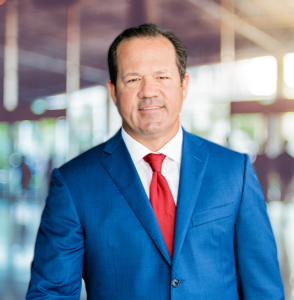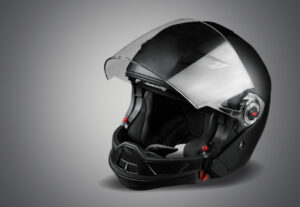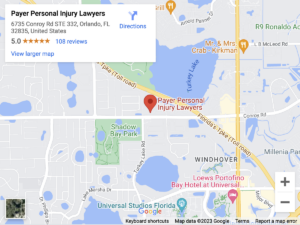
Motorcycle accidents can cause severe or even fatal injuries. These vehicles lack a passenger compartment to protect riders. When they get hit, operators and passengers can suffer head trauma in the initial automobile impact or a secondary road impact after ejection. Worse yet, riders can get trapped under the motorcycle with their heads dragging on the asphalt.
If you fail to comply with Florida helmet laws, an at-fault driver may try to blame you for your injuries. An Orlando motorcycle accident lawyer from Payer Personal Injury Lawyers can help you fight these accusations in your pursuit of fair compensation for your injuries.
Contact our Orlando, FL, law firm today at (407) 648-1510 to schedule a free initial consultation.
How Payer Personal Injury Lawyers Can Help After a Motorcycle Accident in Orlando, FL

Payer Personal Injury Lawyers was founded in 1999 to represent injuLearn about Florida’s helmet laws here. Contact Payer Personal Injury Lawyers to learn how helmet use can affect a motorcycle accident claim in Orlando, FL.red clients in Orlando, Florida, against the people and businesses who harmed them. Our Orlando motorcycle accident attorneys have over 28 years of combined legal experience fighting at-fault parties and their insurers.
If you sustain a motorcycle accident injury, our attorneys can provide you with:
- A free consultation to discuss your case and explain your options
- An aggressive, hands-on approach to holding insurers responsible
- A track record of courtroom success against insurers that refuse to settle
A motorcycle crash can cause injuries that require costly medical care and permanently disable you. Contact our Orlando personal injury lawyers to discuss your motorcycle accident and the compensation you can seek for the injuries you suffered.
How Many Head Injuries Result From Motorcycle Crashes in Florida?
According to the Florida Crash Facts Report, the state had 8,649 motorcycle crashes in 2021.
These crashes caused:
- 621 motorcyclist fatalities
- 7,397 motorcyclist non-fatal injuries
Florida does not identify how many of these motorcyclists suffered head injuries. However, research shows that up to 37% of fatal injuries and up to 38% of non-fatal injuries involve head trauma.
Using these statistics, you can estimate that motorcyclists in Florida suffered:
- 230 fatal head injuries
- 2,737 non-fatal head injuries
You can also use helmet use statistics to estimate head injuries in Florida. Not surprisingly, riders who wear helmets suffer fewer head injuries than those who ride helmetless.
In 2021, motorcycle crash casualties included:
- 297 fatalities and 3,667 non-fatal injuries to helmeted riders
- 312 fatalities and 3,256 non-fatal injuries to unhelmeted riders
Research shows that about 31% of helmeted riders and 38% of unhelmeted riders suffer head injuries.
From these numbers, you can calculate that injured Florida riders included:
- 1,229 head injuries to helmeted riders
- 1,356 head injuries to non-helmeted riders
Even though nearly 52% of riders in motorcycle crashes wore a helmet, unhelmeted riders suffered over 52% of head injuries that year. In theory, universal helmet use could have prevented hundreds of head injuries.
Motorcycle Helmet Law in Florida
The Highway Safety Act of 1966 pushed states to adopt universal helmet requirements. This federal law empowered the U.S. Department of Transportation (DOT) to withhold highway funding from states that did not pass a law requiring all motorcyclists to wear helmets.
At its high point, 47 states had universal helmet laws. After Congress withdrew the DOT’s power to withhold funding, 31 states repealed or diluted their laws. Florida was one of those states.
Florida’s Motorcycle Helmet Law
Florida’s law begins like a universal helmet law. It states that you may not ride on a motorcycle unless you wear a DOT-approved helmet. This law applies to both operators and passengers. If the law stopped there, helmets would be mandatory for all motorcyclists.
But the law then has an exception that renders it nearly unenforceable.
Riders do not need to wear a helmet if they meet both of the following conditions:
- Over 21
- Covered by health insurance that pays for motorcycle crash injuries
As a practical matter, the following riders must wear helmets under Florida law:
- Under 21; or
- Over 21 and uninsured.
Police officers usually cannot determine a rider’s age or health insurance status without stopping them. Additionally, if an officer stops a rider who meets the age and health insurance requirements, they waste the department’s resources and the rider’s time. As a result, officers usually only issue tickets for helmet violations in two situations.
First, they might issue a helmet ticket after stopping a rider for another violation. Thus, when an officer stops an unhelmeted rider under 21 for speeding, they may also issue citations for speeding and a helmet violation.
Second, officers would likely stop a motorcyclist with an unhelmeted child passenger. Motorcycle operators are responsible for making sure young passengers wear helmets and can receive a citation when they fail to do so.
Consequences of Riding Helmetless
In addition to an increased risk of head or brain injury, helmetless riders risk losing their right to recover full injury compensation. Under the doctrine of comparative fault, each person who contributed to your injuries receives a percentage of the fault. If you are assigned a share of the blame, your damages get reduced.
Schedule a Free Initial Consultation With Our Skilled Orlando Motorcycle Accident Attorneys
A motorcycle crash can cause serious injuries regardless of your helmet use. Contact Payer Personal Injury Lawyers for a free consultation to discuss your motorcycle accident injuries and how we can help you recover compensation.

